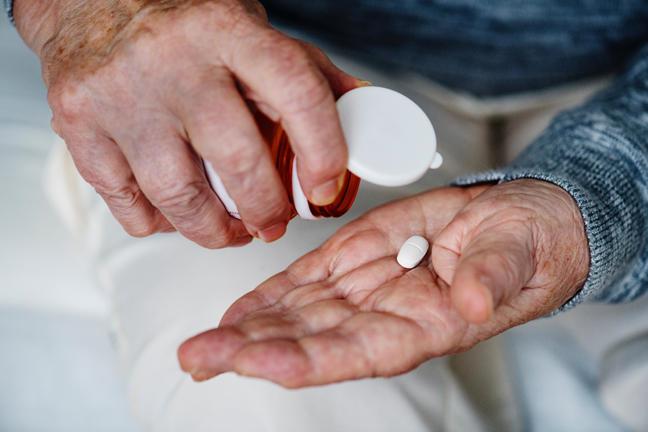Official Newsletter of Drug Free Workplaces
November 2018 Vol. 19 No. 11
Published by The Council on Alcohol and Drugs
Tel (404) 223-2486 | Fax (866) 786-9811 | www.LiveDrugFree.org
Excessive alcohol us is a leading cause o preventable death. www.LiveDrugFree.o
Drug Use by Senior Citizens Increasing
The baby boomer generation (people born between 1946 and 1964) experienced higher rates of drug use than the generations before and after them, and now that baby boomers are aging into retirement, the rate of drug use among seniors is rap- idly increasing.
Alcohol and drug abuse adversely affects approximately 20% of older Americans, and more than 25% of older adults use prescription medicines that have a high potential for causing addiction. This in- crease in drug use by aging parents is creating problems for employees who have to miss work to care for them.
Older adults are more likely to experience chronic health problems and often take prescribed
medication for longer periods of time than younger adults, which can result in an increased risk of misuse and abuse of medication leading to addiction. Combining prescription medicine with alcohol makes the problem much worse and puts older adults at greater health risk.
Having to deal with an alcoholic or drug addicted parent can be a stressful and time-consuming
problem for employees, and the issue of caring for an elderly par- ent who is addicted is more
common than most people realize.
It is important, then, for adult children of elderly parents to be aware of the danger of addiction
occurring later in life and to know the warning signs.
Drug Addiction Among the Elderly—
Warning Signs
There are some indicators of the potential for addiction to watch for in aging parents.
Being lonely or isolated because of the death of a spouse can lead to substance abuse. Adult
children who have been living at home suddenly moving out and leaving the individual alone can
result i excessive alcohol or drug use. Major surgery that requires the use of risky pain
medications such as narcotic painkillers can also be a red flag.
Here are some other warning signs to b on the lookout for:
Neglecting to pay bills
Heavy drinking before, during, o after meals and at holiday get- togethers
Irresponsible gambling
Loss of interest in hobbies
Lack of self-care and poor hygiene
Memory loss
Stopping participation in recreational activities
Behavior changes like becoming hostile or depressed
Becoming easily confused and/o disoriented
One reason that older adults are at risk developing an addiction to their medicine is because of
increased medication sensitivity and slower metabolism and elimination. As people age, it becomes more difficult for alcohol and medicines to be cleared from the body. Senior citizens so often experience higher rates of pain sleep problems, and anxiety, and many rely on prescription medicine to function Too often, elderly adults attempt to self medicate with alcohol and over-the- counter remedies that can cause adverse reactions with prescription medications
According to the Substance Abuse Ment Health Services Administration (SAMHSA), more than 1 million individ als aged 65 or older had a substance u
To help us combat substance abuse, go to www.LiveDrugFree.org and click on “Donate!”
DrugFree@WorkPlace | November 2018 Vol. 19 No. 11 | www.LiveDrugFree.org | Tel (404) 223-2486
disorder last year, including 978,000 older adults with an alcohol use disorder and 161,000 with
an illicit drug use disorder. Illegal drug use (use of illicit street drugs and abuse of
prescription medication) among adults aged 50 or older is projected to increase from
2.2% to 3.1% by 2020.
While alcohol and drug abuse is harmful at any age, it is never more harmful than on the elderly.
The impact of alcohol- and drug-related injuries is much more severe, the risk of harmful
medication interactions is much great- er, and the general physical effects of alcohol and drugs
are more debilitating.
It is a sad situation when senior citizens, who should be receiving honor in their old age, have
to experience the negative consequences of substance use, including physical and mental health
issues, social and family problems, involvement with the criminal justice system, and death from
drug overdose.
Caring for Aging Parents
Alcohol and drug problems, particularly prescription drug abuse, among older adults is one of the
fastest growing health problems facing the country, and more and more employees are having
to deal with the issues caused by elderly parents who have become addicted.
For those who are dealing with health conditions (like addiction and other
health problems) of parents and other family members, the federal Family and Medical Leave Act
(FMLA) provides for 12 weeks of unpaid leave. But to qualify, you must have worked for at least 1
year for an employer that has 50 or more employees. Currently, there is no federal law that requires employers to give consideration to employees with family responsibilities other than the
FMLA.
However, most employers, when made aware of a worker who is struggling with a family member’s health problems, will try to accommodate the employee if possible. Many companies offer flexibility to their workers to help ease the burden for both the company and the employee.
If you have an aging parent or loved one who is suffering from addiction or other chronic health
problems, start by having a direct and open conversation with your supervisor about the issue. Ask
if your schedule can be altered to allow for treatment appointments or if telecom- muting options
are available 1 or 2 days a week. Reasonable leave options might also be an option, and taking sick
days
to care for a family member is a basic benefit offered by most companies.
Also, be sure to seek help for yourself as caring for an addicted person can be stressful and
tiring. Organizations like ReACT (Respect a Caregiver’s Time), https://respectcaregivers.org/,
offer monthly support sessions that focus on the caregivers’ emotional needs.
To help us combat substance abuse, go to www.LiveDrugFree.org and click on “Donate!”

